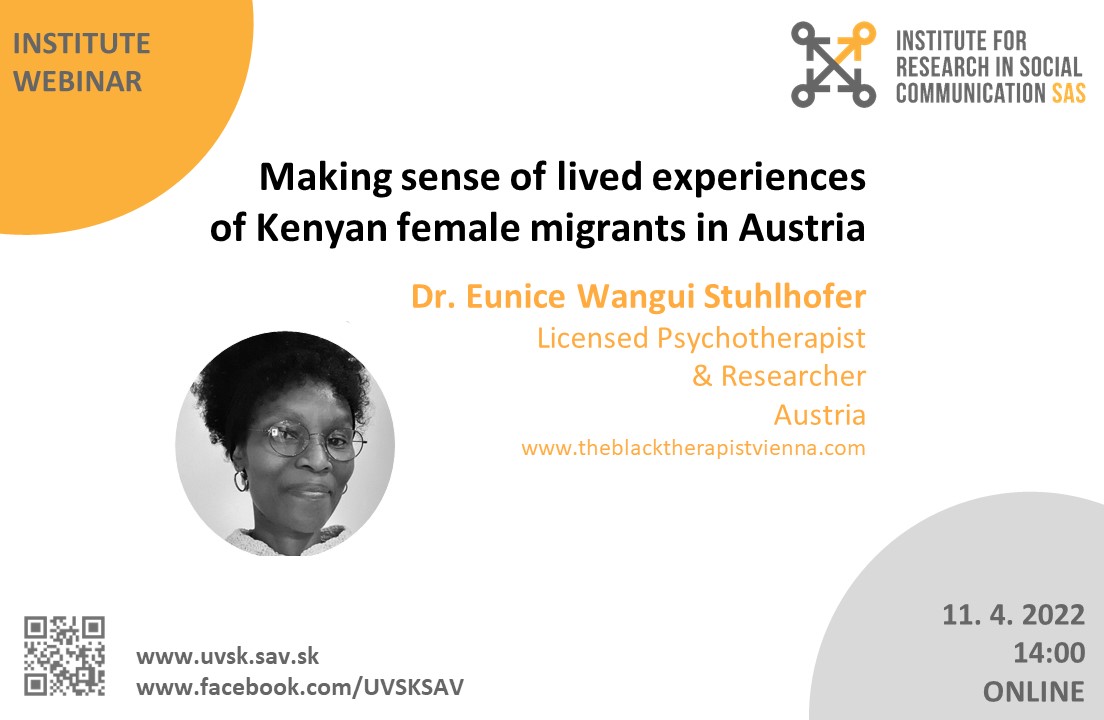Dear colleagues,
We invite you to the institute´s webinar “Making sense of lived experiences of Kenyan female migrants in Austria” authored by our host from Vienna – Dr. Eunice Stuhlhofer. The seminar will be held in English and will focus on coping mechanisms in dealing with acculturation stress among Kenyan migrant women in Austria.
The seminar will take place online. If you are interested in participating, please fill out the simple form: https://forms.gle/eZp5Aha335gamTK56
On the day of the seminar, you will be sent access data to the Zoom meeting. The maximum number of participants outside ÚVSK SAS is 50 people.
Making sense of lived experiences of Kenyan female migrants in Austria
Dr. Eunice Stuhlhofer, Licensed Psychotherapist & Researcher, Austria (www.theblacktherapistvienna.com)
Monday/Pondelok, 11.4. 2022, 14:00 – 15:30, online
In Europe, migration is a controversial topic that draws high political and media attention. African migration into Europe has drawn substantial attention although most Africans migrate within Africa. High unemployment is a leading push factor for international African migration. Migration fatalities from Africa into Europe through the Mediterranean Sea are high. The link between contemporary African migration, colonialism, and neo-colonialism is poorly understood. Research on contemporary African migration is insufficient. While migration remains a contentious issue in Austria with strict policies, Austria’s history and economy have been shaped by migration. Adverse attitudes towards migrants hinder integration. Migration impacts development and benefits both host and sending countries. Gender determines migration decisions and experiences. Female migration is associated with gender-specific risks and vulnerabilities. Female migrants remit more than men but earn less, impacting their social security. Autonomous African female migration has increased. Kenya is a transit, sending, and destination country for refugees and migrants. Most Kenyans migrate to Britain, North America, and the Gulf region. The pursuit of higher education and improvement of life are the main pull and push factors for Kenyan migrants. Gender disparities in Kenya are high. This study investigates lived experiences of Kenyan female migrants in Austria. The study explores their coping mechanisms in dealing with acculturative stress. The study assumption was that Kenyan female migrants in Austria rarely seek psychological services. Studies on African migrants in Austria are scarce and no studies target Kenyan female migrants in Austria. Narrative data were collected from 6 participants and analyzed using the Interpretative Phenomenological Analysis approach. The study identified five themes: making sense of education, finding home, dealing with the unending transition, routine racism, and mixed relationships. The study results could be applied to other groups of African migrants and contribute to gender studies. These findings could be useful to policymakers, mental health providers, and academia.
Keywords: migration, Africa, Kenya, Austria, women, acculturative stress







